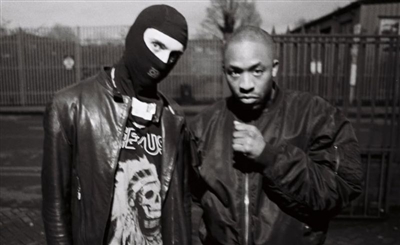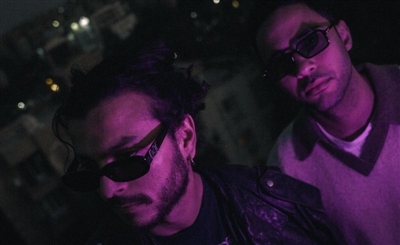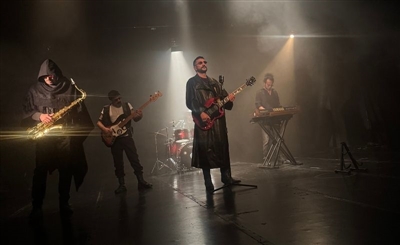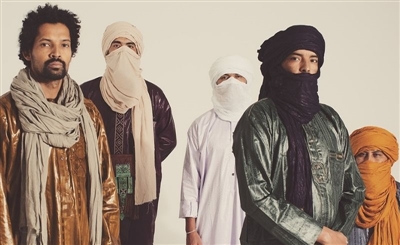Dar Disku’s Debut Album is a Portal Into the Sounds of SWANA Region
The album is a product of the Bahraini electronic duo’s extensive years of researching, listening and experimenting; a tour into their world beyond the dancefloor, recorded using analog techniques.
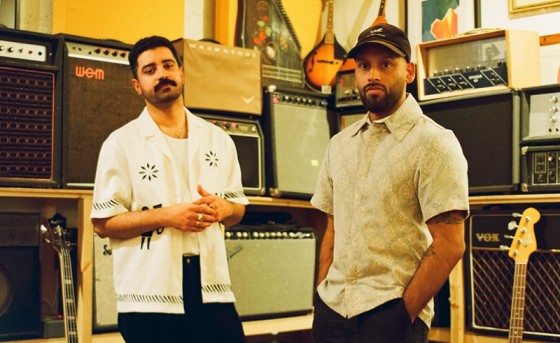
Cover Image by Tia Payne
UK-based Bahraini collective Dar Disku has just released their debut full-length project, a self-titled studio album serving as a sonic journey through time and space that explores the diverse sounds of the SWANA region.
Made up of DJ/producer duo Mazen Almaskati and Vish Mhatre, Dar Disku emerged in 2018 on a mission to unearth the forgotten rhythms of the Middle East, North Africa and South Asia region, as well as lands beyond. The collective has since been sprinkling a heady cocktail of wistful joy across the UK’s dancefloors with their carefully curated DJ sets, club edits and compelling remixes, and have recently been jet-setting between regional and global festivals including Glastonbury, Lost Village and Love International.
-ef67c55d-f39f-4a1b-9eb2-51ace145bb4e.png) Image by Tia Payne
Image by Tia Payne
Mixed by Oliver Wright and recorded using analog techniques at UK’s Humm Studio in Bristol, ‘Dar Disku’ is a culmination of the duo’s extensive years of researching, listening and experimenting, offering a portal into their world beyond the dancefloor. The album, released under Soundway Records, sonically captures what time travelling with Dar Disku’s influences would feel like, and the cosmic emotions of cinematic scores through a meticulous analog approach to live recordings.
“The album came organically through many years of exploring different genres and cultures from the SWANA region, starting with a curiosity to understand the history and craft of the music we’ve long been studying. The end result is a tour of a few of the region’s many soundscapes,” Mazen Almastaki tells SceneNoise.
-932a598c-e77d-458c-a7d5-6eb26e1ee58b.png) Image by Ishaq Madan
Image by Ishaq Madan
Although the eight-track record draws directly from the same breath of Dar Disku’s early edits of Middle Eastern music, its sound is unmistakably rooted in the duo’s current influences, encompassing elements from Egyptian folk, Turkish psychedelia and Algerian rai to Sudanese funk, Ethiopian jazz and Khaleeji disco. It’s something that is comfortingly nostalgic and yet refreshingly new. “During the writing process, I found myself naturally leaning away from electronic music and going back to my roots as an instrumentalist. I listened to a lot of cinematic music, afrobeat, experimental and Disco, from artists like Elias Rahbani, Bappi Lahiri, Tony Allen, Cheb Nasro, Marlena Shaw, Dalton and Asha Puthli,” Vish Mhatre tells SceneNoise.
“Some tracks started with Vish and I jamming in a rehearsal space and experimenting with syncopated patterns and grooves. Others came from exploring a certain instrument, like the oud or pianet, which led us to a really fun afro funk/jazz direction,” Almaskati adds.
-564358a6-b5b6-4574-b32e-09928616382d.png) The album features an extensive list of collaborations with a slew of regional artists, including Bahraini selector Flanah, Tunisian musician Aymen Attia, Turkish star Billur Battal, Indian-American singer-songwriter and producer Asha Puthli, and Algerian singer Yacine Elkhaldi.
The album features an extensive list of collaborations with a slew of regional artists, including Bahraini selector Flanah, Tunisian musician Aymen Attia, Turkish star Billur Battal, Indian-American singer-songwriter and producer Asha Puthli, and Algerian singer Yacine Elkhaldi.
‘Dbyali’, the track featuring Yacine Elkhaldi, was released earlier this year as the first single and preview of the album. The track has been traversing prestigious dance floors in venues and festivals across the globe from Croatia and Bahrain to Rajasthan and London.
“The album’s sound probably locked into place after we finished ‘Dbayli’, which captured the authenticity of the inspirations that came before it whilst also being strikingly out of time, place and genre. It was the effect that we desired while making this album,” Almaskati says. “Dbyali was the first song recorded during the album writing process, which was inspired by our desire to create a track for the smoky discotheques of the SWANA region to play in our club sets. Demos were exchanged via WhatsApp between Bristol and Algeria for almost one month before the track was finalised.”
When speaking of the creative process of the tracks, Mazen says, “The creative process for each track on ‘Dar Disku’ was inherently different in a sense, yet the core of each one stems from one seed that was planted way before the record was fully written. That is, to craft sonic portals to different places and times within the SWANA region with the hope of exposing the listeners to a familiar yet novel sound that reminds them of home.”
-25751007-6b62-4bcb-9cd3-9ac09edea2dd.jpg) Image by Oscar Abdulla
Image by Oscar Abdulla
On the opening track, ‘Leil’, there is a cluster of static noise and samples of speeches that are usually heard on classic Arabic radio shows as well as sounds pulled from the bustling Cairiene streets. That cacophony slowly fades into a dreamy melody of lush synths and crisp riq and soft tabla patterns that extend till the end of the track.
“We tried to transport listeners to a very exciting and important time in terms of musical performance in the region. For a lot of people, this would have been the 1950s in Egypt, which I was introduced to through listening to crackly recordings on my dad’s car radio,” Mazen tells SceneNoise. “We loved the idea of being able to use a sound story and folie to create a story of two friends looking out at the sea just outside the bustling city of Cairo before embarking on a night discovering the music and art surrounding them.”
Meanwhile, ‘Yas Nas’, the only full-length instrumental track on the record, echoes elements from Fela Kuti’s Afro-funk in its distinct grooves and swing patterns, combined with Oud arrangements and syncopated percussive patterns pulled from Sudanese and Yemeni folk music. “It was definitely the most challenging track to make. It had a steep learning curve in terms of understanding the unique Afro-funk genre made by the famous Fela Kuti,” Mazen says.
Out of the eight tracks, ‘Alsutur’, featuring Bahraini artist Flanah, stands out the most, capturing the essence of the record, which is part old, part new, part familiar and part unknown.
Trending This Month
-
Jan 29, 2026



